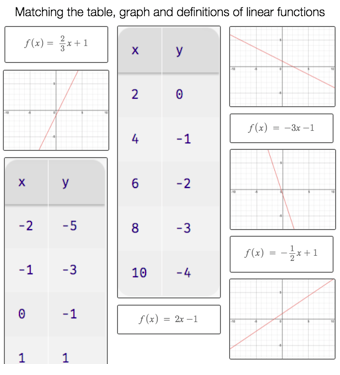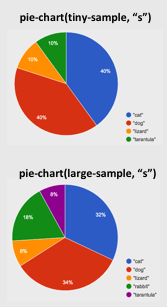Like CMP3, Bootstrap is field-tested and research-validated, with a focus on deep exploration that supports and engages all kinds of learners. Our integrated computing modules have been proven to support math transfer and can be mixed and matched to supplement what you’re already doing in your classroom. Teaching 7th grade math with Bootstrap also addresses many CS Standards, including: 2-AP-1, 2-AP-10, 2-AP-11, 2-AP-13, 2-AP-14, 2-AP-17 2-AP-19, 2-AP-21, 2-DA-08.
| CMP3 Unit |
Integrated Computing Lessons that can extend the CMP3 Unit |
Shapes and Designs:
Two-Dimensional Geometry
|
-
Get your students coding with highly motivational image functions!
-
Writing simple code to build a wide range of shapes of different colors and sizes, reinforces vocabulary for describing polygons.
-
Students think about multiple strategies for describing right-isosceles triangles.
|
Accentuate the Negative:
Integers and Rational Numbers
|
-
Instead of a list of rules to memorize, we use the Circles of Evaluation to expose the structure of the math involved in evaluating expressions. Check it out! It’s a powerful tool.
-
These materials can be used without any programming.
|
Stretching and Shrinking:
Understanding Similarity
|
-
The Wumps are a powerful tool for understanding similarity and distortion.
And, for some students, plotting coordinates by hand is arduous!
-
Looking for follow up materials that will engage students in thinking about scale factors with more immediate feedback? We’ve got you!
-
Simple code allows students to experiment with scaling images up and down and distorting them.
-
The programming environment can work with images as a wide-ranging as a shape, a student’s name, or any image from a student’s google drive.
|
Comparing and Scaling:
Ratios, Rates, Percent, Proportions
|
-
Flags are an authentic application for ratios and scaling!
-
Flags also offer our students a rare opportunity to connect to and share pride in their identities in math class.
-
In this lesson, students write code both to scale and locate shapes on the coordinate grid to recreate an image of their choosing.
-
This activity is low-threshold and high-ceiling. Students of all kinds of minds love building flags - some will make many! And they take great pride in seeing their flags and code hanging on classroom walls.
|
Moving Straight Ahead:
Linear Relationships
|
Defining Linear Relationships
|
Filling and Wrapping:
Three-Dimensional Measurement
|
-
This lesson engages students in analyzing a rectangular prism to identify which dimensions are needed to find the area of each face.
-
Simple code generates a printable set of rectangles labeled with dimensions. Students use printouts to construct paper models of their prisms and calculate the surface area.
-
Ultimately, students can use their model to generate a formula for calculating the surface area of a prism.
|
Samples and Populations:
Making Comparisons and Predictions
|
-
Simple code allows students to quickly generate samples of various sizes from any dataset.
-
In seconds, students can generate pie charts to see how the samples compare to each other and use them to make predictions about the full dataset.
-
Students can test their predictions against findings from the full dataset.
|
These materials were developed partly through support of the National Science Foundation,
(awards 1042210, 1535276, 1648684, and 1738598).  Bootstrap by the Bootstrap Community is licensed under a Creative Commons 4.0 Unported License. This license does not grant permission to run training or professional development. Offering training or professional development with materials substantially derived from Bootstrap must be approved in writing by a Bootstrap Director. Permissions beyond the scope of this license, such as to run training, may be available by contacting contact@BootstrapWorld.org.
Bootstrap by the Bootstrap Community is licensed under a Creative Commons 4.0 Unported License. This license does not grant permission to run training or professional development. Offering training or professional development with materials substantially derived from Bootstrap must be approved in writing by a Bootstrap Director. Permissions beyond the scope of this license, such as to run training, may be available by contacting contact@BootstrapWorld.org.
 Bootstrap by the Bootstrap Community is licensed under a Creative Commons 4.0 Unported License. This license does not grant permission to run training or professional development. Offering training or professional development with materials substantially derived from Bootstrap must be approved in writing by a Bootstrap Director. Permissions beyond the scope of this license, such as to run training, may be available by contacting contact@BootstrapWorld.org.
Bootstrap by the Bootstrap Community is licensed under a Creative Commons 4.0 Unported License. This license does not grant permission to run training or professional development. Offering training or professional development with materials substantially derived from Bootstrap must be approved in writing by a Bootstrap Director. Permissions beyond the scope of this license, such as to run training, may be available by contacting contact@BootstrapWorld.org.






